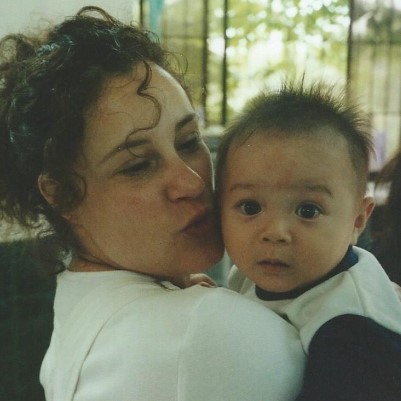 Christine Rhyner
Christine Rhyner Christine Rhyner
Christine Rhyner
I am a wife, adoptive mother, non-fiction writer, defender of human life, amateur photographer & scrapbook-maker. Christians lost the culture war. I believe this is a critical hour for each member of the church to embrace his or her identity in Christ, unite in one mind and one Spirit, and boldly share the gospel with a hurting world.

The Adopted Son Who Almost Wasn't
“In all of my experience helping to place thousands of foreign-born children with adoptive parents, I’ve never experienced such a tough set of circumstances causing so much disappointment to two families,” says Mr. Ray, our adoption director.

People say,
"It’s the journey, not the destination."
The Israelites did not think so when they wandered through the desert for forty years in search of the promised land.
How Much Did You Pay For Her?
Understanding why people say what they do is the first step toward compassion, as it allows us to glimpse another perspective. This can lead to giving others grace an undeserved gift of letting people off the hook for what they say that eventually leads us to forgive them.
Reflections in the Healing Pool
One Saturday I decided to catch up with a good friend. Over lunch she confided in me her struggle with taking prescribed medication to correct a chemical imbalance she had been diagnosed with by a psychiatrist. I listened with a sympathetic ear until she said that she anticipated the departure of her depression as that of having to “say good-bye to an old friend.”
“An old friend!” I gasped, incredulous. The uncomfortable silence that followed made me regret my instant rush to judgement. I didn’t know how Christ would have responded, but my friend’s downcast eyes made me want to understand.
Later, at home, I searched healing Scriptures in the Bible and found myself in John, Chapter Five and “The Healing Pool.”
Reading about the only instance in the New Testament in which Jesus asks someone if they wanted to get well, I felt convicting goosebumps rise on my arms. Unexpectedly, the Holy Spirit began showing me about my own resistance to healing.
The paralytic answers Jesus’ question by focusing not on the hope before him, but on the obstacles faced during thirty-eight long years watching others get results. (If indeed there was a stirring of the pool that healed people). Sadly, I realized the power I have given to obstacles in my own life over God’s great ability to heal. If I had set my sights on the One Who heals rather than my emotions, it could have taken a lot less time for the Holy Spirit to renew and restore me for service to the Lord.
Instead, I saw that I was responsible for time ill spent by hiding behind the “comparison barrier” I had built before the Lord. I thwarted the Lord’s healing attempts by looking at others growing in their faith and in ministry by telling myself things like, “God must love her more,” or “He can take care of that, he’s got greater gifts,” or “She’s a better Christian than me…”
Patiently the Holy Spirit revealed to me that the first step on a healing journey requires surrender of those obstacles that are unique to us as individuals, yet universal in their result of raising a barrier to God’s divine touch in our lives. Gently, Jesus had pried open my white-knuckled fingers that had clutched to the “old self.” As if I were an onion, he was peeling away layer after layer of my inner “soulish” woman to reveal at my core the close companionship of my own friends—negativity and pride. I had bouts of entertaining them with either brooding or making mental lists of how I could be more righteous before God. The truth is emotions lie and we cannot sanctify ourselves. 1 Thessalonians 5:24 says, “The One who calls you is faithful and he will do it.” Not us, but Him in us. We are already made righteous before God when we accept Christ.
I thought of that paralytic lying beside the pool for more than a generation, possibly nursing resentment, frustration and sorrow. Maybe he gave up all hope and desire to help himself until all these things bloomed into a kind of safe and familiar pain. He tells Jesus in verse 7: “I have no one to help me into the pool when the water is stirred.” No one? It’s difficult to imagine that thirty-eight years brought with them no one person willing to assist this lame man in an effort to be given the ability to walk again. If I were in his position, I could see myself begging others to drag me right up to the edge of that pool before it stirred, rather than recline under a colonnade.
But then, this illustration may demonstrate humankind’s tendency to withdraw into the predictability of suffering rather than risk leaping into healing pools at a price.
There is a cost to being made well. We’re not made well just to enjoy healing, though that’s part of it. We’re made well to be vocal in praise and thanksgiving, to tell others about miracles in our lives and minister healing to them. The paralytic was given working legs and feet to do it.
But when the paralytic is confronted about who healed him, he has no idea. Didn’t he want to know? Wouldn’t he have wanted to run, with renewed legs, to find his healer, to shout out to others the amazing thing that had just happened to him?
When Jesus re-encounters the man the next day, He says to him, “See, you are well again. Stop sinning or something worse may happen to you” (John 5:14). This is a shocking statement never said to anyone else in the Scriptures from a merciful and compassionate Lord. Was the man’s paralysis the result of some sin in his life? We just don’t know. But maybe, our divine Healer was demonstrating that we are to speak our testimony about Jesus to others. It is the message we are urged to spread among a hurting and fallen world. The very next verse says, “Then the man went and told the Jewish leaders that it was Jesus Who had healed him.
I next made the important decision to be part of Jesus’ healing ministry by calling my friend and telling her I knew just what she had meant that day, by sharing what the Holy Spirit had revealed to me.
Discussion Questions
Are there any obstacles in your life that create a barrier between you and God?
Do you entertain any “friends” because they are predictable and comfortable?
Do you regularly share with others about God healing you of old wounds and transforming your life?
Closing prayer
Father God, thank you for your Holy Spirit Who makes us aware of obstacles and barriers we put up against wholeness found through you. We ask you for the deep healing and transformation only You can do in us, and a willingness to share our victories through you. “We are more than conquerors through Christ who loved us” (Romans 8:37).
Finally, John waves me over. They’re ready to see us in one of the offices in the back of the building. Relief surges through me. It’s tough to see all these babies while having a body that just refuses to conceive. I don’t want to imagine that any of them are unwanted, resented or not provided for properly.
Children’s wailing echoes in the hallways as I follow John. Expressionless women avoid eye contact as they hurriedly pass us by. Though their faces give no clue as to why they are here, nobody seems particularly happy to be where they are. Except for my husband and me. We’re really quite heartened and eager to have yet one more step of the adoption journey about to be completed.
After our blood is drawn, we’re ushered into an office to wait in chairs facing a desk that takes up about half the miniscule room. On the wall behind the desk there are at least a dozen children’s drawings. Many of the pictures are made out to a “Bob” who we have yet to meet.
Around ten minutes later he greets us in his office and tells us the HIV test is accompanied by both a sexual questionnaire and counseling. I can’t quite believe what I am hearing.
I can feel myself flush with annoyance when Bob asks, “How many sexual partners have you had, and do you currently have?” Ridiculously he next asks us, “How many times have you had unprotected sex?”
Bob treats us like we’re some kind of promiscuous swingers instead of a married, committed Christian couple trying to adopt a baby. I can’t understand why this line of questioning is necessary for adoption. Either Bob didn’t get the memo or it’s because the Department of Health is government run with inane bureaucratic protocols.
Nobody, but nobody has to complete a lengthy sexual questionnaire in order to conceive a child! This is a tad more than violating. But I’m fearful too. Should I protest to any of these requirements, someone may be able to squash our adoption plans. Worse than all of this invasiveness however, is what Bob does after the “counseling” on safe sex practices. He stands up and grabs something from his desk drawer.
“Our parting gift,” he says, and hands me…a condom.
Gift? I’m too stunned to say anything. As he hands me the square, plastic package, I don’t know whether to laugh or fling it back at old Bob in disgust at the utter insensitivity and irony of being handed a contraceptive device. I’m already feeling emotionally battered and bruised from all that has gotten me here in the first place. There was last year’s failed fertility intervention. Then, there was the foster care option that I hoped would produce a baby that turned into pressure to take on a near grown teen. And now, we’re still in the thick of adoption requirements. I have felt longing, envy, sadness, impatience and self-condemnation for being childless in the first place. Both John and I have been subjected to endless interrogation and introspection. Now, to top it all off, I get to go home with a free condom—yippee!
As John and I walk out into the near empty parking lot, we see only one other car, parked several yards away from ours. It’s a beat up, early model, dingy, white-colored Chevy Impala with its windows wide open. It’s unusual these days to see a car with its windows rolled down. But then I notice something moving inside. Actually, it’s not a something, but a someone—two someones!
Inside the battered old car on the front, passenger seat is a boy of about two years old. Behind him, strapped into a car seat is an infant. The little boy watches us. I can’t quite believe what I’m seeing. There isn’t an adult in sight. My initial, gut reaction is one of concern for these two babies left alone in a parked car. But I’m also angry, feeling subjected to two offending situations within the space of a minutes. After all we are going through, it just burns me up to know that people are so irresponsible as to leave babies alone in a car.
Frozen, I can do nothing for a few seconds, but stare intently at these children, wondering what God would have me to do. I begin griping to John about the obviously horrible parents these kids have, ending my monologue with, “And people like us can’t have babies, honestly!” But I don’t squeal on the parent or parents. Two women head for the car. The children become animated with familiarity.